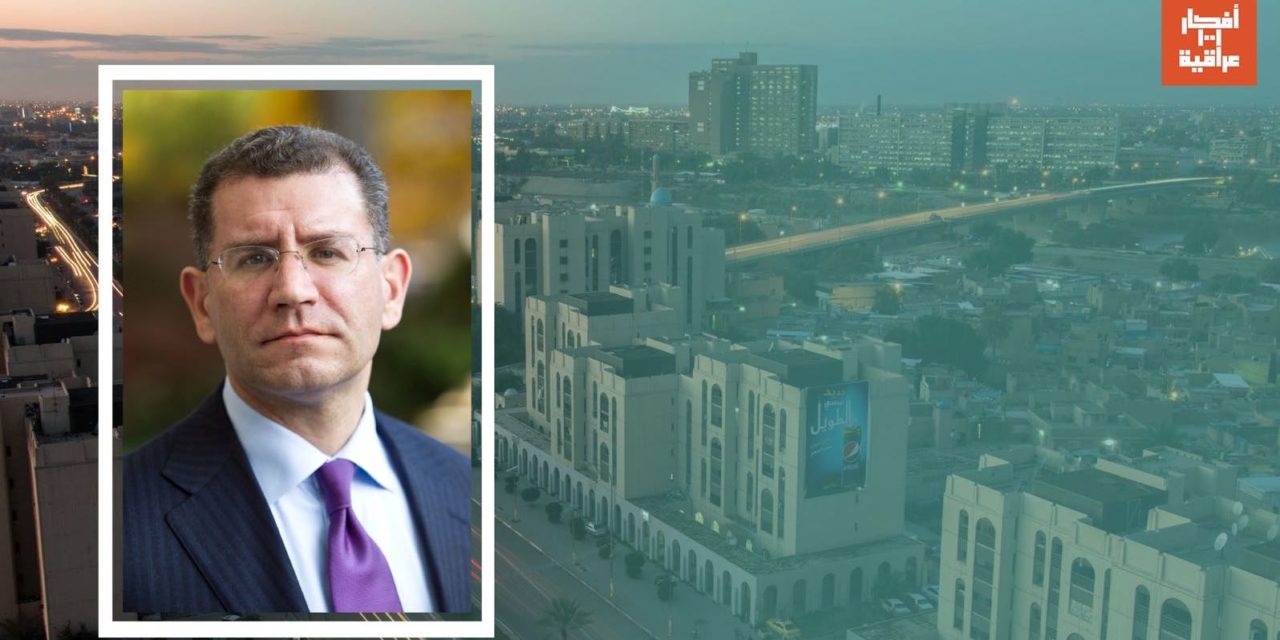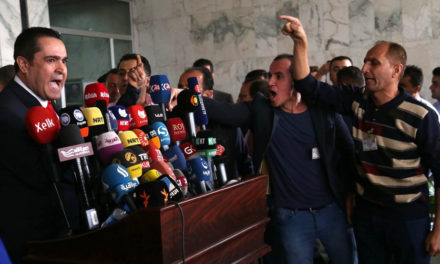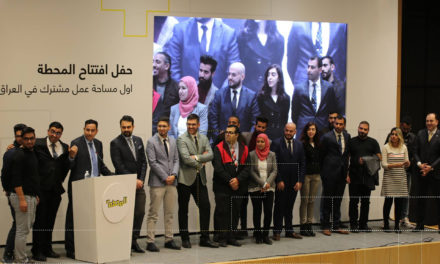Kenneth M. Pollack is a resident scholar at the American Enterprise Institute (AEI) in Washington, DC, where he works on Middle Eastern political-military affairs, focusing in particular on Iran, Iraq, Saudi Arabia, and the Gulf countries. He was recently in Baghdad on a short visit to explore the situation following the elections. 1001 Iraqi Thoughts contributing writer, Ihsan Noori, interviewed him to get his perspective on recent developments in the country.
What do you think is the main reason for the improvements in security in Iraq, particularly in the capital?
Briefly, I think there are three principal reasons for the improved security in the capital. First, the defeat of Daesh by Iraq and its Coalition partners which has badly reduced the capability of the group to carry out terrorist attacks. Second, the massive drop in their ability to recruit new terrorists, a function both of their military defeat and the widespread sentiment among Iraqis (particularly Sunni Iraqis) that whatever their frustrations, Daesh is not the answer. Third, the considerable improvement in the capabilities of the Iraqi Security Forces and the dramatically revised and improved security plan for Baghdad devised and implemented by the ISF and the U.S. military.
Having just been in Baghdad, security remains excellent; the city continues to feel quite safe and Baghdadis go about their lives far less concerned about security than I have ever seen them since 2003. That said, we should recognize that this new tranquility could prove short-lived. Daesh is already regrouping and is once again holding some small parcels of territory in Diyala, Anbar, and up near Hawija. That is a worrying sign. They are able to recruit some people out of sheer economic necessity. And the progress of the ISF is very uneven and heavily dependent on both the independence they have enjoyed over the past four years and the strong American and other Coalition support they have received. If a new government sends the American troops packing again, it is likely to be devastating to the ISF.
Do you think the next Iraqi government should cut austerity measures adopted by the current government, given the rise in oil prices?
No, absolutely not. Austerity is never popular, but in many places it is absolutely vital. Iraq is top of that list (I would also suggest the U.S. should be on the list too, but that is a very different story). Oil prices are going to fluctuate from now until the last drop is pumped. It is no basis for long-term development, prosperity, or social harmony. Iraq desperately needs to diversify its economy—to develop stronger service, agricultural, and financial sectors. Rather than taking the modest increase in government revenues and pumping it back into consumption, it would be far better to use that money to deal with the horrific problems in infrastructure, the banking sector, agriculture, vocational education, etc. Using it to invest in ”e-government” to improve the efficiency and diminish the corruption of the Iraqi bureaucracy would be enormously beneficial and a far better use of the additional revenue rather than fattening up the subsidies all over again.
How should the Iraqi military establishment be reconfigured now that the war against Daesh has ended? What role should the Hashd Al-Sha’abi play within the Iraqi security framework moving forward?
I want to start by saying that the Hashd played a critical role in saving Iraq from the threat of Daesh in 2014 and in liberating the country from Daesh in 2015-2017. Their contribution needs to be remembered and rewarded. Collectively, all of Iraq owes them a great debt of gratitude, and individually they deserve to be compensated for the service they performed for their country. I mean every word of that and I think it is crucial for Iraq to honor the contributions of the Hashd.
However, it is equally true that the Hashd, in its current form, has gone from being the savior of Iraq to becoming its potential downfall. What is vital and necessary in wartime is often ruinous in peacetime. History has repeatedly demonstrated that a parallel military, one which controls its own resources, recruitment, and leadership selection, inevitably undermines peace and prosperity. Whether it is the Roman legions, the Japanese armed forces pre-1945, the Egyptian army, Lebanese Hizballah, or Iran’s Revolutionary Guard, the historical pattern is unavoidable and unanimously disastrous. Parallel militaries in which the state does not choose (and cannot dismiss) the leadership, in which the state cannot control the distribution of resources within the organization, and cannot determine recruitment and assignment of personnel always produces catastrophes of one kind or another and never lead to happy outcomes. Look at the mess Egypt is in today. Look at how weak Lebanon is. Think of how Japan’s military leaders got it into a war that absolutely destroyed their country.
If the Hashd al-Sha’abi is going to continue to exist in the future, but do so in a way that does not ruin Iraq economically, politically, and/or militarily, it needs to be radically restructured. It would need to be turned into a reserve paramilitary organization more like the American National Guard or perhaps the earlier incarnation of the Iranian Basij. The existing Iraqi chain of command needs to have complete control over who is in charge of which formations, how resources are allocated throughout the Hashd chain of command, and how personnel are recruited and assigned to formations of the Hashd. The system that has existed so far, of individual leaders recruiting, promoting, and demoting their own fighters and officers; determining the allocation of weapons, supplies, and money, to those personnel; and having no accountability to the leadership for failing to execute orders or for the disposition of those resources, absolutely has to end. If it doesn’t, Iraq will never be the strong, prosperous, peaceful, and independent state that every Iraqi wants it to be.
What do Sunni political elites need to do to rectify the disunity within their ranks?
This is both an easy and a hard question. At one level, the answer is easy: unite. Iraq’s Sunni leaders need to set aside their selfish ambitions, focus on the broader needs of their community, and get past their endless petty grievances against one another. That truly is the right answer. It’s just very hard to do so in practice. One could argue that the Sunnis need a charismatic leader who could unite them all—a Nasser, a Mandela, a Havel. That would be great and would certainly solve the problem, but such leaders only come along once in a great while. You can sit around bemoaning your fate waiting for the Almighty to send you a leader to solve your problems for you.
Ultimately, the problem that the Sunnis face is the problem that all Iraqis face: Iraq has a horrible political system. Iraq’s proportional representation is the worst form of democracy for Iraq because it encourages factionalism and fragmentation (which in turn encourages corruption and paralysis). It isn’t just the Sunnis who are fragmented and lack strong leaders—are the Shi’a any better? Even the Kurds are succumbing to it in the wake of the death of Mam-Jalal (and Nashirwan Mustafa). Until the Iraqi political system is changed, its perverse incentives will push the Sunnis and the whole country toward greater entropy. It is why I have always believed that constitutional reform was necessary if Iraq were ever going to achieve its great potential. But I increasingly fear that it will also be necessary to stave off the worst case scenarios, such as renewed civil war, revolution, or the slow dissolution of the state. It is going to be hard for Iraq to survive, let alone thrive, with this system.
After the experience of the referendum, do you think that Kurdish parties have shifted their approach to engaging with Baghdad or will aspirations for independence persist?
I think that both are true simultaneously. I think that the vast majority of Kurds still yearn for independence. In fact, for many of them, the way that the rest of Iraq reacted to the referendum hardened their determination to someday achieve independence. But I think it is equally true that the Kurds now recognize that they are not economically, diplomatically, or militarily strong enough to achieve it in the near term. That has forced them to recognize that they are going to remain a part of Iraq for some time—possibly a long time—and they need to make the best of it. That means working with Baghdad to try to get the best deal they can for themselves, not just trying to ignore Iraqi politics and wall themselves off from it.
There are some important lessons for the rest of Iraq in that dichotomous perspective. Lessons that many Iraqis seem determined to avoid. The Kurds are now back in the fold, but very unhappily so. That’s potentially problematic because the Kurds represent about 20 percent of the population, roughly 50 seats in the Council of Representatives, and they have their own territory and military forces. They can become a major spoiler in Iraqi politics if they want to play a destructive role. Obviously, that could ultimately lead to another bout of civil war, but for a more restrained example of the mess the Kurds can make of Iraqi politics, have a look at the current Iraqi constitution. If the Kurds are going to be convinced to become constructive players in Iraqi politics, then the rest of Iraq is going to have demonstrate a lot more magnanimity than they have so far. The Kurds cannot be treated as a conquered people, but as valued partners. That is going to be hard to do in Baghdad’s current, poisonous anti-Kurdish atmosphere but absolutely necessary.

Ihsan Noori
Ihsan Noori is a political writer and a contributor to Inside Iraqi Politics.










